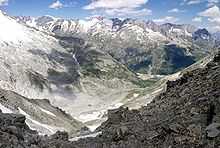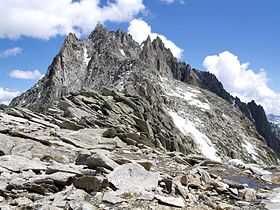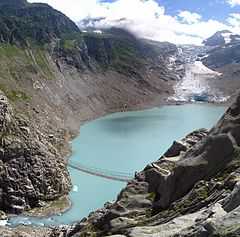Uri Alps
| Uri Alps | |
|---|---|
| German: Urner Alpen | |
|
The Dammastock from the Göscheneralp valley | |
| Highest point | |
| Peak | Dammastock |
| Elevation | 3,630 m (11,910 ft) |
| Coordinates | 46°38′28″N 8°25′6″E / 46.64111°N 8.41833°ECoordinates: 46°38′28″N 8°25′6″E / 46.64111°N 8.41833°E |
| Geography | |
|
<div style="padding:2px 2px 2px 2px;>  | |
| Country | Switzerland |
| Cantons | |
| Parent range | Alps |
| Borders on | Bernese Alps, Emmental Alps, Lepontine Alps and Glarus Alps |
The Uri Alps (also known as the Urner Alps) are a mountain range in central Switzerland in the western part of the Alps. They extend into the cantons of Obwalden, Valais, Bern, Uri and Nidwalden and are bordered by the Bernese Alps to the west (Grimsel Pass), the Emmental Alps to the north (Brünig Pass), the Lepontine Alps to the south (Furka Pass) and the Glarus Alps to the east (Reuss).
The Uri Alps are composed of two distinct groups separated by the Susten Pass. The Dammastock massif on the south is the most glaciated part while the northern part, which culminates on Titlis, has lower summits but greater extent.
Geography

The group south of the Susten Pass forms the dividing range between the head waters of the Aar (west) from those of the Reuss. In addition a small portion of the range (south-west) is located in the basin of the Rhone. This part lies entirely within the valley of the Rhone Glacier. This group forms a complex mass including four considerable ridges and attains its greatest height at the Dammastock and the Galenstock. The group includes four nearly parallel ridges running NNW. and SSE. That forming the eastern boundary of the valley of Hasli reaches 3,383 metres at the Tieralplistock, whence it extends NNW. to the Mährenhorn, and south to the Gärstenhörner. A wide reservoir of snow whence the Trift Glacier flows to the north and the Rhone Glacier to the south, divides this range from the more easterly range whose highest point is the Dammastock. North of the Dammastock the range collectively known as the Hinter Tierberg, attains 3,447 metres. Further east than the last is the Sustenhorn range, rising at its highest point to 3,505 metres, divided from the last by the Stein Glacier and the upper part of the Göschenental. Lastly, another ridge still further east is separated from the last by the Voralptal, a branch of the Göschenental. Its highest summits are the Fleckistock and the Stucklistock. The lower part of the Göschenental is bounded on the south by a range running west to east diverging from the ridge between the Dammastock and the Galenstock.[1]
On the north side of the Susten Pass the ranges are lower and, except the highest mountains on the south, free of glaciers. The main ridge, culminating at the Titlis divides the basins of the Aar and the Reuss. From the Grassen, tripoint border between the cantons of Berne, Obwalden and Uri, a small range diverges from the main watershed and runs from west to east and culminates at the Gross Spannort.
Principal summits


The principal summits of the Uri Alps are:
|
|
Glaciers
Main glaciers :
- Rhone Glacier
- Trift Glacier
- Stein Glacier
- Tiefen Glacier
References
- Swisstopo maps



